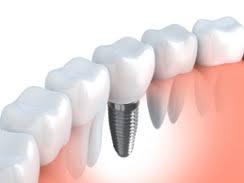As anyone who has false teeth – either a partial denture or full dentures – can attest, there is a huge difference between these artificial teeth and real teeth. Tooth loss is an event that happens, however, and it can have a profound impact on a person’s quality of life.
Our predecessors didn’t have a choice when they faced tooth loss, either partial or total. Their remedy was a partial or complete denture. In today’s world, those requiring tooth extraction or losing teeth through injury have the option of dental implants.
Dental Implants Explained
Simply put, dental implants are metal posts, usually made of titanium, designed to mimic the structure of a natural tooth. The titanium post takes the place of the tooth’s “root.” Once inserted into the bone of the jaw, it acts as a support for a crown, bridge or full denture. The replacement crown or tooth attached to it can look and act like a natural tooth, even lasting a lifetime when cared for properly.
Implant technology has become so refined that most patients who face tooth loss can benefit from it. Even patients once told they were not viable candidates for the procedure are now receiving dental implants. Anyone who has one or more missing teeth can benefit from dental implants, even if the missing teeth are a result of injury or irreparable decay. If you have a bridge, partial or complete denture with which you are not comfortable, implants may be an option for you.
Benefits of dental implants
One of the main benefits of dental implants is they act like natural teeth, restoring the chewing power lost with standard dentures. Most patients report they can tell no difference between natural teeth and implanted teeth. Other advantages include:
Implants prevent bone loss. Without teeth, the bone of the jaw will deteriorate and recede over time. An implant replaces the lost root, which restores chewing ability. This action provides the stimulation necessary for normal bone growth.
Longevity. Dentures and bridges are generally replaced around every 10 years. Implants can last a lifetime when properly cared for.
Implants give adjacent teeth a stable environment. A vacant gap from a missing tooth can cause other teeth to shift into the gap.
Dental implants help to prevent gum disease.
Dental implants can prevent the facial sagging that is a common result of bone loss from missing teeth. These changes, if left uncorrected, can result in excess wrinkles around the mouth and a thinning of the lips. These alterations give the impression of advanced age.
Dentures vs dental implants
What are the advantages of dental implants over traditional dentures or bridges? The main difference is the quality of life for the recipient. Even the best fitting dentures will eventually become unstable and require refitting. From a health point of view, implants are far superior. Poor chewing ability can force the denture wearer to alter eating habits, often resulting in an inadequate diet. This can be especially detrimental in elderly denture wearers.
Other points to consider when deciding on dentures vs dental implants are:
Brushing and flossing are part of normal care for implants, just like natural teeth. To clean dentures, removal is necessary.
A full denture covers the roof of the mouth. Implants don’t require a covering in the roof of the mouth.
With dentures, there is always the risk of slipping while eating or speaking. Implants and implant-mounted bridges are securely anchored to prevent slipping.
Implants prevent the facial collapse that results in an appearance of aging.
If you’re unhappy with your appearance because of missing teeth, or your dentures are uncomfortable and interfering with your quality of life, consider dental implants. Contact Morrin Dental in Newcastle today for an appointment.
To comply with the AHPRA Legislation we are required to advise that “Any surgical or invasive procedure carries risks. Before proceeding, you should seek a second opinion from an appropriately qualified health practitioner.”
